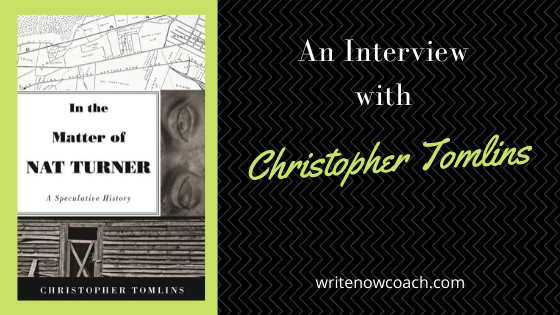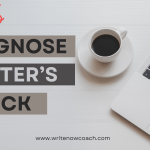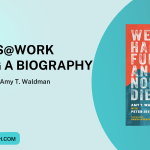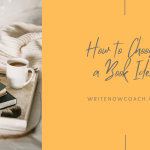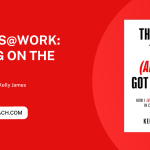Writers@Work: On Writing About History
April 14, 2020
Note From Rochelle
Dear Writers,
I have amazing news! I’ve joined Bookshop, an online platform that allows you to shop online for the books I recommend. A percentage of your purchase will help support my business and independent bookstores! From now on, all of the affiliate links for books will be featured on a page in The Write Now! Coach Bookshop. Now that’s a win win!
Interested in writing about history? Today I’m delighted to welcome Professor Christopher Tomlins to the blog to talk about his new book, In the Matter of Nat Turner. He shares his unique view on Nat Turner and the book about his life, The Confessions of Nat Turner, as well as tips for researching and writing about history.
And a note to readers: this interview is longer than most. But it’s full of such amazing and helpful information, I did not want to cut it. Take it slowly and enjoy!
Happy Writing!
Rochelle
Writers@Work: An Interview with Christopher Tomlins
On Writing about History
Welcome to the blog, Chris. Can you tell us a bit about your new book, In the Matter of Nat Turner.
Thanks for the invitation! In the Matter of Nat Turner is an attempt to recover the historical person Nat Turner, the Virginia slave who is well known to Americans for leading the violent uprising that bears his name (The Turner Rebellion) in 1831, immortalized as such most recently in Nate Parker’s movie, Birth of a Nation. Beyond that, Turner is best known as a complete mystery, an enigma. The historian and Turner devoté Kenneth Greenberg describes him as “the most famous, least-known person in American history.” I call my book A Speculative History—that is the second part of the book title, after the colon—because it tackles the mystery of Nat Turner by placing a premium on conjecture and imagination, of wondering about the connections between events, causes, origins, and outcomes. As an intellect, a thinking person, Nat Turner is a mystery because he exists only in tiny fragments of text. So conjecture and imagination are essential if one is to retrieve him from the past for history.
Can you say a little more about what you mean by “a speculative history”?
By emphasizing the importance of speculation I don’t mean that I am making things up: I treasure the scraps of empirical evidence on which my book relies, because they are the only way I can have access to this fascinating person. But the questions I wanted to ask about him could only be answered by inspecting those fragments minutely and then interleaving them with other texts—theological, philosophical, sociological, anthropological, literary, legal—that provide me with the imaginative means of interpreting what’s in the fragments. Throughout my research, I wanted to know, what did he believe? What did he think he was doing in engaging in what looks like a hopelessly quixotic act of murderous violence against impossible odds? What impact did he have? The image that stayed with me throughout was of a rock thrown into a pond—a sudden and unexpected splash and then ripples spreading from the impact. I thought of Turner as the splash and as the point of origin of all the ripples. I wanted to explain the splash and to follow the ripples as they spread across the pond.
As a writer, I’ve always been interested in The Confessions of Nat Turner. You devote Part One of the book to exploring this text. Can you share with our readers some of the insights you gained while studying both the content and the structure of the piece?
We have access to Turner as a thinking person because while a prisoner awaiting trial and execution he spent the better part of three days talking to a local attorney, named Thomas Ruffin Gray, who subsequently published a pamphlet account of their extended meeting, entitled The Confessions of Nat Turner. William Styron used the same title for his fictionalized autobiography of Nat Turner, published in 1967. I use the controversy around Styron’s Confessions of Nat Turner as my point of entry on my own investigation, and then, as you note, I give a lot of attention to Gray’s pamphlet, because it is the only means to gain any insight into Turner as an intellect. Gray was down on his luck and hoped to make some money off Turner’s notoriety by publishing his pamphlet, which means that as historical evidence the pamphlet has to be used very carefully—if it is Turner’s voice it comes to us filtered through the mind of his white amanuensis. So my first objective in examining the pamphlet is to ascertain just how much one can rely on what that voice says.
How can that be done?
I concentrate first on the pamphlet’s structure—how is this text assembled? It is quite a complex document with multiple components. By breaking it up into its constituent parts we can see how Gray builds a cage of controls around the text of Turner’s confession narrative that urge the reader to read it in a particular way. This desire to control how the narrative is read suggests to me that the narrative itself is comparatively free of direct manipulation. I also argue that the narrative falls into two parts, and that the part that describes Turner’s life prior to the rebellion is composed more roughly or clumsily than the part that describes the rebellion itself. Gray was interested in Turner’s life, but he was much more invested in producing an “authentic” account of the rebellion, which he had studied closely independent of his conversation with Turner. In my view the first part was written hastily from notes taken during the prison encounter, whereas the much more careful composition of the second part suggests it already existed in semi-finished form.
Why go to such lengths?
I go to these lengths in analyzing the structure of the pamphlet in the book because I want to show that, notwithstanding its compromised origins in the work of an impoverished white attorney, the substance of Turner’s narrative can indeed be relied on as his narrative, particularly his account of himself. In other words, all the work on the structure of the pamphlet is an absolutely essential preliminary to an exploration of its substance.
How have other historians treated Turner’s narrative?
Most readers of Gray’s Confessions read Turner’s narrative as Gray designed it, a single linear account in which the life’s final bloody events appear as an outcome ordained virtually from infancy. In my view this is a basic error. Turner’s account of himself describes a painful struggle for spiritual maturity and a search for his calling both of which become utterly central in his life long before he turns to any intimation of interracial violence. Turner’s account of himself is of a life, as was Christ’s, of preparation: a precocious infant gifted with uncanny knowledge; an adult tested in the wilderness, come to grace and baptism, confronted in his maturity by an immense task given to him by God that nearly breaks him, on the outcome of which rides the salvation of all. Turner substantiates this account of himself through scriptural reference, which I interleave with theological commentary to build an interpretation of their meaning. Other readings tend to treat Turner’s scriptural references as if they were decoration—he’s a religious man, and religious people sprinkle biblical citations into their discourse. In my view Turner’s pattern of biblical citation is far more systematic. In a way, the most exciting discovery to me was to realize that the sequence of spiritual experiences, visions, and revelations that Turner describes was wrapped in a coherent and sophisticated pattern of biblical citation that discloses a really sophisticated messianic theology. As his faith matures he moves from acceptance of God’s call to service, to discipleship, to visions of the crucifixion and of Revelation’s promise of the second coming, and finally to his own transfiguration and his assumption of the burden of redemption. Turner, in my view, thought of himself as the redeemer returned.
As a historian, what inspired you to write this book? What new ideas did you hope to discover?
Most historians concentrate on the event of the rebellion, and tend to avoid the intensity of Turner’s religiosity. In my view they do not read the pamphlet as carefully as it should be read. I had been curious about Nat Turner for many years, since I first read Gray’s Confessions. But I never wrote about him. When I was trying to recover from my last book, Freedom Bound, published in 2010 (I always go through a period of fear and anxiety after finishing a major project, when I believe I will never have another interesting thought) I cast around desperately for something new to focus on, and eventually I decided that it was time to scratch the itch. Freedom Bound was a big ambitious scholarly book that addressed close to a half millennium of Anglo-American history, and I told myself that research on Nat Turner would be much more precise, more focused. Instead I soon found myself writing about God! But in fact what attracted me was precisely the mixture of violence and messianic religious fervor that the name “Nat Turner” represents. In the way that I think about history I am deeply influenced by the German-Jewish literary critic and philosopher of history, Walter Benjamin (1892-1940). To someone with Benjaminian sympathies, Turner’s apocalyptic Christianity and the violence that results is irresistible! And then, as the project matured, I realized that I could also use it to express how I thought myself about the creative act of writing history. So In the Matter of Nat Turner is not just a work of history, but also a book about history—my attempt to expound my own philosophy of history.
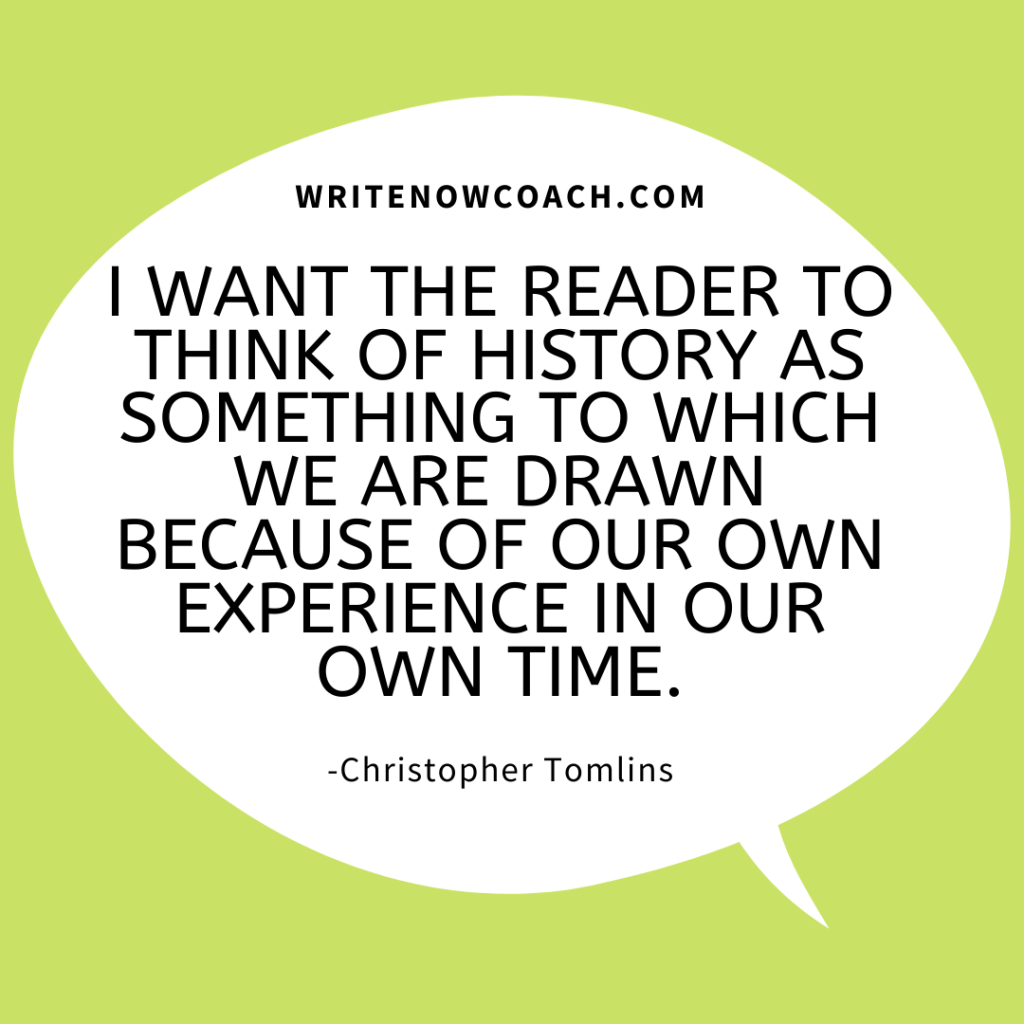
I love the invitation you offer the reader in the preface, “I invite you, reader, to join me and to assume your own critical standpoint in relation to the layers of narrative you will encounter.” What roles do you hope readers will take on as they read your book and others like it?
As I say in a note to the preface, my invitation is a Benjaminian invitation. I want the reader to think of history not as the chronicle of a past from which we have inevitably departed, from which we are separated by an unbridgeable temporal caesura, but as experience that we can recognize, and to which we are drawn because of our own experience in our own time. In this way of thinking, history is an image, a constellation, formed in the present by the conjunction of things past with the “now” that observes those things. Constellations of stars in the night sky form images that do not exist as such independent of our observation of them. It is the act of observation (or remembrance) that creates the image, that enlivens past experience, that recognizes it and retrieves it. When I observe Nat Turner as a conjunction of religion and violence, that has a special “recognizability” to the “now” that I inhabit, because the conjunction he stands for is alive and present in our contemporary world. Other readers may find very different instances of recognizability in the materials I have attempted to lay before them. Rather than have readers passively absorb what I have to say, rather than persuade them to see the images I see, I want them to inspect their own interactions with the materials I present and ask themselves questions about those interactions. Benjamin calls the moment of reading “perilous” and “critical” because, at least potentially, it is in the act of reading that one becomes self-aware. History, for me, is the possibility of self-awareness through lively interaction with prior awareness.
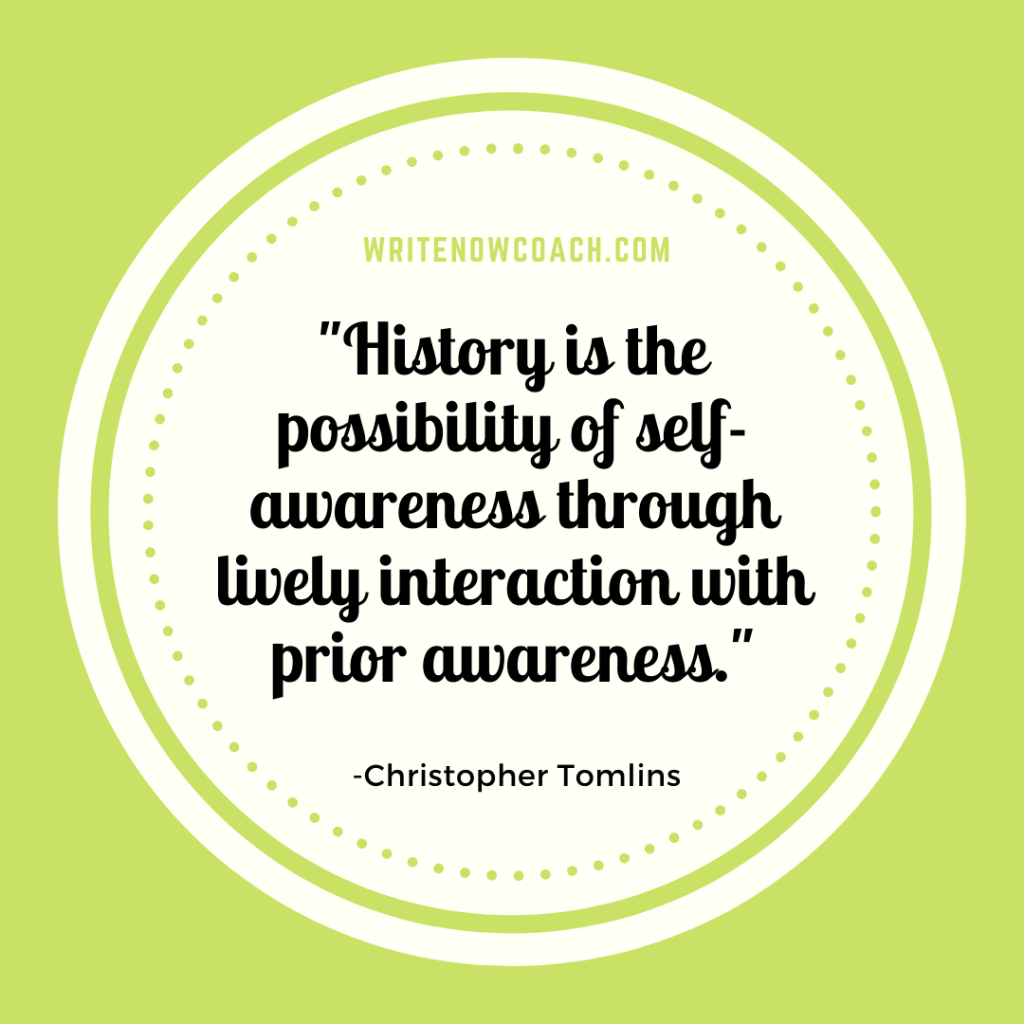
When you are writing about history, how do you juggle research and writing? What tips do you have for our readers?
As you and your readers will know only too well, historical research requires a lot of painstaking accumulation of empirical knowledge about the substance of past lives and events. Training in social science disciplines like Sociology or Economics consists largely in teaching the student a set of techniques that can then be applied to different sets of “data,” like a hammer in search of a nail. History is much more akin to anthropology—incessant reading, incessant observation. That said, I try hard always to be writing, either about the substance of the research I am engaged on, or about the theory or philosophy of history that informs the way I think about my research. When I was working on what became In the Matter of Nat Turner I told myself to keep producing what I thought of as tentative or provisional research papers. I persisted in describing those papers to myself as “experiments” rather than proto-chapters because I felt that as long as I could call my work experimental I had a license to “speculate” in the constructive fashion that I have tried hard to carry over into the book. And it worked.
I love the idea of breaking a large project into smaller steps—in this case, writing provisional research papers. I’m also fascinated by the idea of downplaying the seriousness of the project by thinking of each paper as an experiment instead of a chapter. What else helped you?
Professional academics are very lucky because they have access to a huge and developed structure of workshops, seminars, conferences, and scholarly meetings for which they can write papers and try out ideas. Academia has a vast collection of all manner of scholarly journals that will consider refined versions of those papers for publication as scholarly articles. So academic life puts a premium on writing, and everyone (it seems) is always in a fever of writing! For those of your readers who are academics by background, the best tip I can offer is to be sure to take advantage of all those opportunities to keep writing and refining your ideas as you go, because doing so will help keep your ideas (and energies) focused and active. If you don’t have access to academic outlets, I would search for others—there are innumerable outlets for creative writing, from periodicals to blogs. It’s easy to start your own blog! My view is that it is essential to keep writing even if the only consumer at this point is yourself. I’d even say it matters less what one writes about than that one writes about something. Writing is like exercise—if you don’t write then your muscles will waste away.
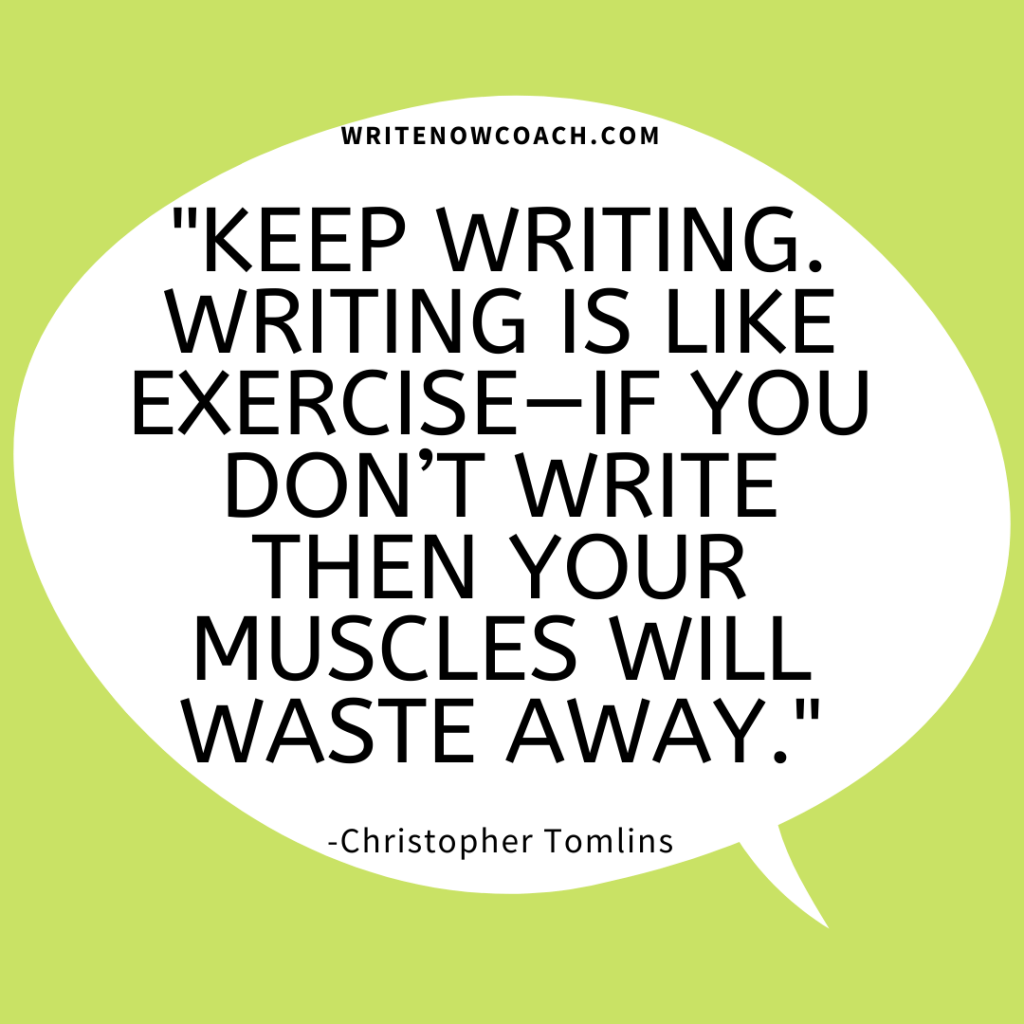
What has the pandemic been like for you?
Berkeley transitioned to online instruction around March 13, and as the six counties in the Bay Area adopted a joint “shelter in place” policy, the University withdrew staffing from all academic units and cautioned faculty members against coming to campus to work in our offices. Then, beginning midnight on Sunday March 22, campus turned from caution to outright prohibition. All this was a big blow to me because for many years my custom has been to treat my faculty office as my workspace and not to work at home at all. I made a hasty final trip to try to pick up some essential papers, and a laptop that I normally leave in my office, and then tried to reorient myself.
It happens that this calendar year I am on teaching leave (I had been saving up earned sabbatical allowance for a long time!) so I am unlike many of my colleagues who have had to transition to online instruction from their homes, via Zoom. That might seem like an advantage—one problem I don’t have to confront. But in a way I am envious because I am not picking up that particular familiarity/skill, and I suspect that in future years when natural disasters (bushfires, earthquakes) interrupt in-person instruction, we will be expected to transition rapidly to online instruction, and so I will be behind the skill curve. And of course the other problem is that I had plans to use my sabbatical year which are now pretty disrupted, and I won’t get the time again.
So, how am I adapting? Well, first I decided to throw myself into reading. I am following up on my interest in the history of labor law and the implications of that history for working people and their organizations today. I plan to write a critical essay in recent scholarship in this area as a springboard into developing it as a multiyear research project. Because internet access is unaffected by this (nonelectronic) virus (unlike the controlled power cuts we had in the Bay Area during fire season last fall), I can access a vast range of scholarly materials through services like Hein Online (a huge legal materials and periodicals database) and JStor (an even bigger international database of academic research). I am using these to accumulate the research base I need. I can also access journals through Oskicat—the university library catalog server—and legal materials through Berkeley Law’s own library. There is also an ever-growing volume of archival material available online, whether old editions (expired copyright) through the Hathitrust digital library, or the vast number of databases that academics have available to them through university subscriptions. During our interview I mentioned how academics were lucky to have the extended structure of seminars and talks and workshops through which they could try out ideas and essays. We are no less lucky in the range of online data services to which we have access through our institutions. Berkeley is of course a major research university, one of the finest in the world, and a substantial part of what it does as a research university is make databases freely available (at staggering cost) to the undergraduate and graduate student and faculty communities it serves.
Of course, under current circumstances I am reading differently. I used to print relevant academic articles and read them on paper, writing notes in the margins. I can’t do that at home, so I am using Acrobat to mark up digital copies and save them—I have learned that this is just as efficient as my former practice (although in a different way), which means that I may never return to printing and penciling!
And what do you do when you’re not working?
I am also trying to use this time to teach myself that I don’t actually have to work all the time! I was a little burned out after finishing In the Matter of Nat Turner. And I don’t know whether you and your readers have noticed (although I am sure some have) that there is an extraordinary explosion of digital activity accompanying our “shelter in place” condition. I can take museum tours, listen to New York Metropolitan Operas, and sample music and entertainment from all over the world. We are experiencing an extraordinary spontaneous outpouring of cultural richness, all available at our fingertips. Much has been available on the internet for years, but the quantity and quality is on an incredible upward curve as a result of the virus. It makes me think of how, during World War Two, in England, Dame Myra Hess became famous and beloved because she organized lunchtime concerts to replace those made impossible by blackouts required to avoid nighttime bomber targeting. All told, 1700 such concerts took place during the years of the war, 1939-1945, beginning in the London Blitz and complete with radio broadcasting. We are witnessing a kind of 21st century equivalent.
Most important in my view, this is not just activity sponsored by conventional institutions. For example, my incredibly inventive daughter has adapted an online gaming platform (“Discord”) to assemble groups of people from all over the country to gather each evening (with a matinee on Sundays!) to do live cold-readings of Shakespeare plays. Anyone can join, whether as audience members or as players. Each play is cast from whoever turns up to the daily casting call, which is followed by a technical check of communications, and an hour later off we go! It is an extraordinary experience, like nineteenth century families gathering each night to read together. (A note on joining: Anyone is welcome to come listen, and anyone is welcome to participate! The only requirements for reading for a role are having a way to broadcast your voice and being genuinely enthusiastic about doing so. Rather than auditions, casting is done on a first-come-first-serve basis, and anyone can throw their hat in the ring for any role regardless of experience or whether or not it would be considered “proper” casting. It does involve downloading Discord. Here’s the link to their Facebook page: https://www.facebook.com/14thnightplayers/
I am certain spontaneous activities like this are going on all over the place. Indeed, for my money, we are seeing the internet coming into its own as a medium for active generation of forms of community to replace the in-person contact that we have all lost, rendered impossible by the virus. Eventually the virus will pass, and we will all be able to emerge from isolation and hug each other, but everything we have learned (like my daughter’s “14th Night Players”) will stay with us. It is going to make those big structured corporate concerns like Facebook look ridiculously out-of-date. My rash prediction is, five years from now Facebook will be out of business.
What are you reading now?
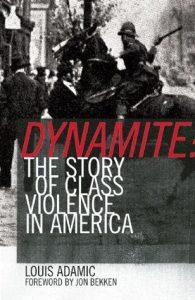 I’m reading a collection of academic essays called U.S. Labor Law for the Twenty-First Century, which sounds very dry (and it is), but alongside it I’m reading a book first published in 1931 called Dynamite: The Story of Class Violence in America by Louis Adamic (1898-1951). Dynamite is a popular history of the labor movement in the United States, which stresses just how violent that history has been. I am reading these books because I am thinking about returning to an old interest of mine – the history of the American labor movement, and the history of the law that governs workers and their unions. In the early twentieth century organized labor was in rather desperate shape, and it is even worse off now. In line with my philosophy of history as I’ve tried to explain it, I’m interested in the conjunction between the politics and law of our “now” and that past moment of violence and exploitation, and the law and politics that it produced. What happens when we put them alongside each other? What images form from that conjunction?
I’m reading a collection of academic essays called U.S. Labor Law for the Twenty-First Century, which sounds very dry (and it is), but alongside it I’m reading a book first published in 1931 called Dynamite: The Story of Class Violence in America by Louis Adamic (1898-1951). Dynamite is a popular history of the labor movement in the United States, which stresses just how violent that history has been. I am reading these books because I am thinking about returning to an old interest of mine – the history of the American labor movement, and the history of the law that governs workers and their unions. In the early twentieth century organized labor was in rather desperate shape, and it is even worse off now. In line with my philosophy of history as I’ve tried to explain it, I’m interested in the conjunction between the politics and law of our “now” and that past moment of violence and exploitation, and the law and politics that it produced. What happens when we put them alongside each other? What images form from that conjunction?
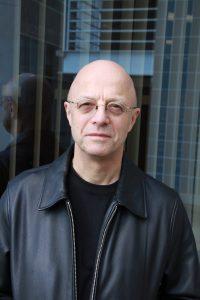 Christopher Tomlins is the Elizabeth Josselyn Boalt Professor of Law at the University of California, Berkeley, and an affiliated research professor at the American Bar Foundation, Chicago. His many books include Freedom Bound: Law, Labor, and Civic Identity in Colonizing English America, 1580–1865 and Law, Labor, and Ideology in the Early American Republic. He lives in Berkeley.
Christopher Tomlins is the Elizabeth Josselyn Boalt Professor of Law at the University of California, Berkeley, and an affiliated research professor at the American Bar Foundation, Chicago. His many books include Freedom Bound: Law, Labor, and Civic Identity in Colonizing English America, 1580–1865 and Law, Labor, and Ideology in the Early American Republic. He lives in Berkeley.

